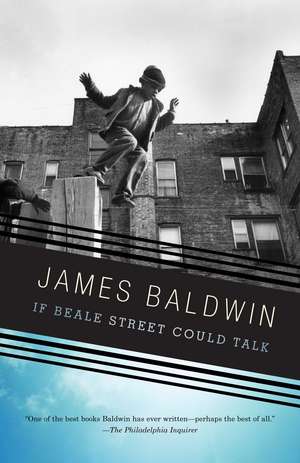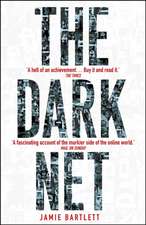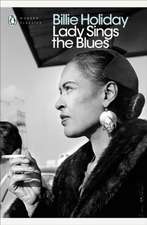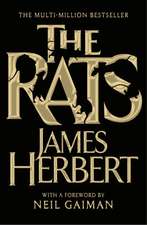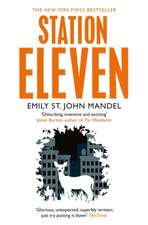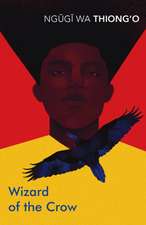If Beale Street Could Talk: Vintage International (Paperback)
Autor James Baldwinen Limba Engleză Paperback – 31 oct 2006
| Toate formatele și edițiile | Preț | Express |
|---|---|---|
| Paperback (2) | 46.94 lei 24-35 zile | +15.64 lei 4-10 zile |
| Penguin Books – 28 sep 1994 | 46.94 lei 24-35 zile | +15.64 lei 4-10 zile |
| Vintage Books USA – 31 oct 2006 | 84.88 lei 3-5 săpt. | +14.33 lei 4-10 zile |
Preț: 84.88 lei
Nou
Puncte Express: 127
Preț estimativ în valută:
16.24€ • 16.78$ • 13.52£
16.24€ • 16.78$ • 13.52£
Carte disponibilă
Livrare economică 04-18 martie
Livrare express 15-21 februarie pentru 24.32 lei
Preluare comenzi: 021 569.72.76
Specificații
ISBN-13: 9780307275936
ISBN-10: 0307275930
Pagini: 197
Dimensiuni: 132 x 203 x 15 mm
Greutate: 0.18 kg
Editura: Vintage Books USA
Colecția Vintage Books
Seria Vintage International (Paperback)
ISBN-10: 0307275930
Pagini: 197
Dimensiuni: 132 x 203 x 15 mm
Greutate: 0.18 kg
Editura: Vintage Books USA
Colecția Vintage Books
Seria Vintage International (Paperback)
Notă biografică
James Baldwin was born in 1924 and educated in New York. He is the author of more than twenty works of fiction and nonfiction, including Go Tell It on the Mountain; Notes of a Native Son; Giovanni’s Room; Nobody Knows My Name; Another Country; The Fire Next Time; Nothing Personal; Blues for Mister Charlie; Going to Meet the Man; The Amen Corner; Tell Me How Long the Train’s Been Gone; One Day When I Was Lost; If Beale Street Could Talk; The Devil Finds Work; Little Man, Little Man; Just Above My Head; The Evidence of Things Not Seen; Jimmy’s Blues; and The Price of the Ticket. Among the awards he has received are a Eugene F. Saxon Memorial Trust Award, a Rosenwald Fellowship, a Guggenheim Fellowship, a Partisan Review Fellowship, and a Ford Foundation grant. He was made a Commander of the Legion of Honor in 1986. He died in 1987.
Extras
Troubled About My Soul
I look at myself in the mirror. I know that I was christened Clementine, and so it would make sense if people called me Clem, or even, come to think of it, Clementine, since that's my name: but they don't. People call me Tish. I guess that makes sense, too. I'm tired, and I'm beginning to think that maybe everything that happens makes sense. Like, if it didn't make sense, how could it happen? But that's really a terrible thought. It can only come out of trouble--trouble that doesn't make sense.
Today, I went to see Fonny. That's not his name, either, he was christened Alonzo: and it might make sense if people called him Lonnie. But, no, we've always called him Fonny. Alonzo Hunt, that's his name. I've known him all my life, and I hope I'll always know him. But I only call him Alonzo when I have to break down some real heavy shit to him.
Today, I said, "--Alonzo--?"
And he looked at me, that quickening look he has when I call him by his name.
He's in jail. So where we were, I was sitting on a bench in front of a board, and he was sitting on a bench in front of a board. And we were facing each other through a wall of glass between us. You can't hear anything through this glass, and so you both have a little telephone. You have to talk through that. I don't know why people always look down when they talk through a telephone, but they always do. You have to remember to look up at the person you're talking to.
I always remember now, because he's in jail and I love his eyes and every time I see him I'm afraid I'll never see him again. So I pick up the phone as soon as I get there and I just hold it and I keep looking up at him.
So, when I said, "--Alonzo--?" he looked down and then he looked up and he smiled and he held the phone and he waited.
I hope that nobody has ever had to look at anybody they love through glass.
And I didn't say it the way I meant to say it. I meant to say it in a very offhand way, so he wouldn't be too upset, so he'd understand that I was saying it without any kind of accusation in my heart.
You see: I know him. He's very proud, and he worries a lot, and, when I think about it, I know--he doesn't--that that's the biggest reason he's in jail. He worries too much already, I don't want him to worry about me. In fact, I didn't want to say what I had to say. But I knew I had to say it. He had to know.
And I thought, too, that when he got over being worried, when he was lying by himself at night, when he was all by himself, in the very deepest part of himself, maybe, when he thought about it, he'd be glad. And that might help him.
I said, "Alonzo, we're going to have a baby."
I looked at him. I know I smiled. His face looked as though it were plunging into water. I couldn't touch him. I wanted so to touch him. I smiled again and my hands got wet on the phone and then for a moment I couldn't see him at all and I shook my head and my face was wet and I said, "I'm glad. I'm glad. Don't you worry. I'm glad."
But he was far away from me now, all by himself. I waited for him to come back. I could see it flash across his face: my baby? I knew that he would think that. I don't mean that he doubted me: but a man thinks that. And for those few seconds while he was out there by himself, away from me, the baby was the only real thing in the world, more real than the prison, more real than me.
I should have said already: we're not married. That means more to him than it does to me, but I understand how he feels. We were going to get married, but then he went to jail.
Fonny is twenty-two. I am nineteen.
He asked the ridiculous question: "Are you sure?"
"No. I ain't sure. I'm just trying to mess with your mind."
Then he grinned. He grinned because, then, he knew.
"What we going to do?" he asked me--just like a little boy.
"Well, we ain't going to drown it. So, I guess we'll have to raise it."
Fonny threw back his head, and laughed, he laughed till tears come down his face. So, then, I felt that the first part, that I'd been so frightened of, would be all right.
"Did you tell Frank?" he asked me.
Frank is his father.
I said, "Not yet."
"You tell your folks?"
"Not yet. But don't worry about them. I just wanted to tell you first."
"Well," he said, "I guess that makes sense. A baby."
He looked at me, then he looked down. "What you going to do, for real?"
"I'm going to do just like I been doing. I'll work up to just about the last month. And then, Mama and Sis will take care for me, you ain't got to worry. And anyway we have you out of here before then."
"You sure about that?" With his little smile.
"Of course I'm sure about that. I'm always sure about that."
I knew what he was thinking, but I can't let myself think about it--not now, watching him. I must be sure.
The man came up behind Fonny, and it was time to go. Fonny smiled and raised his fist, like always, and I raised mine and he stood up. I'm always kind of surprised when I see him in here, at how tall he is. Of course, he's lost weight and that may make him seem taller.
He turned around and went through the door and the door closed behind him.
I felt dizzy. I hadn't eaten much all day, and now it was getting late.
I walked out, to cross these big, wide corridors I've come to hate, corridors wider than all the Sahara desert. The Sahara is never empty; these corridors are never empty. If you cross the Sahara, and you fall, by and by vultures circle around you, smelling, sensing, your death. They circle lower and lower: they wait. They know. They know exactly when the flesh is ready, when the spirit cannot fight back. The poor are always crossing the Sahara. And the lawyers and bondsmen and all that crowd circle around the poor, exactly like vultures. Of course, they're not any richer than the poor, really, that's why they've turned into vultures, scavengers, indecent garbage men, and I'm talking about the black cats, too, who, in so many ways, are worse. I think that, personally, I would be ashamed. But I've had to think about it and now I think that maybe not. I don't know what I wouldn't do to get Fonny out of jail. I've never come across any shame down here, except shame like mine, except the shame of the hardworking black ladies, who call me Daughter, and the shame of proud Puerto Ricans, who don't understand what's happened--no one who speaks to them speaks Spanish, for example--and who are ashamed that they have loved ones in jail. But they are wrong to be ashamed. The people responsible for these jails should be ashamed.
And I'm not ashamed of Fonny. If anything, I'm proud. He's a man. You can tell by the way he's taken all this shit that he's a man. Sometimes, I admit, I'm scared--because nobody can take the shit they throw on us forever. But, then, you just have to somehow fix your mind to get from one day to the next. If you think too far ahead, if you even try to think too far ahead, you'll never make it.
Sometimes I take the subway home, sometimes I take the bus. Today, I took the bus because it takes a little longer and I had a lot on my mind.
I look at myself in the mirror. I know that I was christened Clementine, and so it would make sense if people called me Clem, or even, come to think of it, Clementine, since that's my name: but they don't. People call me Tish. I guess that makes sense, too. I'm tired, and I'm beginning to think that maybe everything that happens makes sense. Like, if it didn't make sense, how could it happen? But that's really a terrible thought. It can only come out of trouble--trouble that doesn't make sense.
Today, I went to see Fonny. That's not his name, either, he was christened Alonzo: and it might make sense if people called him Lonnie. But, no, we've always called him Fonny. Alonzo Hunt, that's his name. I've known him all my life, and I hope I'll always know him. But I only call him Alonzo when I have to break down some real heavy shit to him.
Today, I said, "--Alonzo--?"
And he looked at me, that quickening look he has when I call him by his name.
He's in jail. So where we were, I was sitting on a bench in front of a board, and he was sitting on a bench in front of a board. And we were facing each other through a wall of glass between us. You can't hear anything through this glass, and so you both have a little telephone. You have to talk through that. I don't know why people always look down when they talk through a telephone, but they always do. You have to remember to look up at the person you're talking to.
I always remember now, because he's in jail and I love his eyes and every time I see him I'm afraid I'll never see him again. So I pick up the phone as soon as I get there and I just hold it and I keep looking up at him.
So, when I said, "--Alonzo--?" he looked down and then he looked up and he smiled and he held the phone and he waited.
I hope that nobody has ever had to look at anybody they love through glass.
And I didn't say it the way I meant to say it. I meant to say it in a very offhand way, so he wouldn't be too upset, so he'd understand that I was saying it without any kind of accusation in my heart.
You see: I know him. He's very proud, and he worries a lot, and, when I think about it, I know--he doesn't--that that's the biggest reason he's in jail. He worries too much already, I don't want him to worry about me. In fact, I didn't want to say what I had to say. But I knew I had to say it. He had to know.
And I thought, too, that when he got over being worried, when he was lying by himself at night, when he was all by himself, in the very deepest part of himself, maybe, when he thought about it, he'd be glad. And that might help him.
I said, "Alonzo, we're going to have a baby."
I looked at him. I know I smiled. His face looked as though it were plunging into water. I couldn't touch him. I wanted so to touch him. I smiled again and my hands got wet on the phone and then for a moment I couldn't see him at all and I shook my head and my face was wet and I said, "I'm glad. I'm glad. Don't you worry. I'm glad."
But he was far away from me now, all by himself. I waited for him to come back. I could see it flash across his face: my baby? I knew that he would think that. I don't mean that he doubted me: but a man thinks that. And for those few seconds while he was out there by himself, away from me, the baby was the only real thing in the world, more real than the prison, more real than me.
I should have said already: we're not married. That means more to him than it does to me, but I understand how he feels. We were going to get married, but then he went to jail.
Fonny is twenty-two. I am nineteen.
He asked the ridiculous question: "Are you sure?"
"No. I ain't sure. I'm just trying to mess with your mind."
Then he grinned. He grinned because, then, he knew.
"What we going to do?" he asked me--just like a little boy.
"Well, we ain't going to drown it. So, I guess we'll have to raise it."
Fonny threw back his head, and laughed, he laughed till tears come down his face. So, then, I felt that the first part, that I'd been so frightened of, would be all right.
"Did you tell Frank?" he asked me.
Frank is his father.
I said, "Not yet."
"You tell your folks?"
"Not yet. But don't worry about them. I just wanted to tell you first."
"Well," he said, "I guess that makes sense. A baby."
He looked at me, then he looked down. "What you going to do, for real?"
"I'm going to do just like I been doing. I'll work up to just about the last month. And then, Mama and Sis will take care for me, you ain't got to worry. And anyway we have you out of here before then."
"You sure about that?" With his little smile.
"Of course I'm sure about that. I'm always sure about that."
I knew what he was thinking, but I can't let myself think about it--not now, watching him. I must be sure.
The man came up behind Fonny, and it was time to go. Fonny smiled and raised his fist, like always, and I raised mine and he stood up. I'm always kind of surprised when I see him in here, at how tall he is. Of course, he's lost weight and that may make him seem taller.
He turned around and went through the door and the door closed behind him.
I felt dizzy. I hadn't eaten much all day, and now it was getting late.
I walked out, to cross these big, wide corridors I've come to hate, corridors wider than all the Sahara desert. The Sahara is never empty; these corridors are never empty. If you cross the Sahara, and you fall, by and by vultures circle around you, smelling, sensing, your death. They circle lower and lower: they wait. They know. They know exactly when the flesh is ready, when the spirit cannot fight back. The poor are always crossing the Sahara. And the lawyers and bondsmen and all that crowd circle around the poor, exactly like vultures. Of course, they're not any richer than the poor, really, that's why they've turned into vultures, scavengers, indecent garbage men, and I'm talking about the black cats, too, who, in so many ways, are worse. I think that, personally, I would be ashamed. But I've had to think about it and now I think that maybe not. I don't know what I wouldn't do to get Fonny out of jail. I've never come across any shame down here, except shame like mine, except the shame of the hardworking black ladies, who call me Daughter, and the shame of proud Puerto Ricans, who don't understand what's happened--no one who speaks to them speaks Spanish, for example--and who are ashamed that they have loved ones in jail. But they are wrong to be ashamed. The people responsible for these jails should be ashamed.
And I'm not ashamed of Fonny. If anything, I'm proud. He's a man. You can tell by the way he's taken all this shit that he's a man. Sometimes, I admit, I'm scared--because nobody can take the shit they throw on us forever. But, then, you just have to somehow fix your mind to get from one day to the next. If you think too far ahead, if you even try to think too far ahead, you'll never make it.
Sometimes I take the subway home, sometimes I take the bus. Today, I took the bus because it takes a little longer and I had a lot on my mind.
Recenzii
"One of the best books Baldwin has ever written–perhaps the best of all." –The Philadelphia Inquirer“A moving, painful story, so vividly human and so obviously based on reality that it strikes us as timeless.”–Joyce Carol Oates"If Van Gogh was our nineteenth-century artist-saint, James Baldwin is our twentiethth-century one." –Michael Ondaatje"Striking and particularly haunting. . . . A beauty, especially in its rendering of youthful passion." –Cosmopolitan"A major work of black American fiction... His best novel yet, even Baldwin's most devoted readers are due to be stunned by it."–The New Republic"Emotional dynamite... a powerful assault upon the cynicism that seems today to drain our determination to confront deep social problems."–Library Journal"A moving, painful story, so vividly human and so obviously based on reality that it strikes us as timeless." –The New York Times Book Review
Descriere
In this honest and stunning novel, Baldwin has given America a moving story of love in the face of injustice. In a love story that evokes the blues, where passion and sadness are inevitably intertwined, Baldwin creates two characters so alive and profoundly realized that they are unforgettably ingrained in the American psyche.
